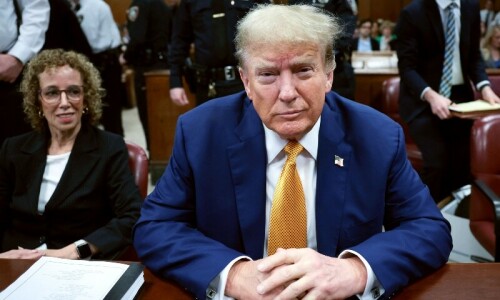LONDON, Nov 14: Britain will boost security at stations, airports and other potential targets to protect them against car bombings and counter a growing threat from militants, Prime Minister Gordon Brown said on Wednesday.
Brown also announced that Britain would spend 400 million pounds ($831 million) abroad on fighting radicalisation. For the first time, Britain will sponsor events in Pakistan to counter extremist propaganda, he said.
Crowded locations in Britain such as restaurants, theatres, cinemas, schools and hospitals will be given instructions on how to improve security arrangements, Brown told parliament as he unveiled a draft of new security proposals.
The measures follow a review of possible infrastructure weaknesses begun after the discovery of car bombs in London and an attack on Scotland’s Glasgow Airport in June.
The Glasgow incident, where a fuel-laden jeep was rammed into the entrance of the airport causing a huge fireball, was the most dramatic attack in Britain since four suicide bombers killed 52 people on London’s transport system on July 7, 2005.
“The conclusion today of the review ... identifies a need to step up physical protection against possible vehicle bomb attacks,” Brown said.
“This will include, where judged necessary, improved security at railway stations ... and at airport terminals, ports and over 100 sensitive installations.”
The measures include putting in new barriers, vehicle exclusion zones and making buildings blast resistant. There will also be 160 counter-terrorism advisers provided to train staff at crowded places such as shopping centres to identify threats.
The announcement comes a week after Jonathan Evans, head of the MI5 domestic intelligence agency, warned the number of militants in Britain was growing.
He said there were 2,000 people who posed a direct threat to national security, some as young as 15, and the agency suspected there were many others as yet unknown.
Brown also set out details of a new unified border force, tougher biometric visa requirements and proposals for the electronic screening of all passengers.
His statement came days after Mohammad Abdul Bari, head of the Muslim Council of Britain, warned that emphasising the Al Qaeda threat was helping to create a climate of fear and suspicion, similar to Nazi Germany in the 1930s.
“There is no greater priority than the safety and security of our people and building the strongest possible relationships across all faiths and communities,” Brown said.
Brown said the government planned to start easing tight baggage restrictions at British airports.
Since August 2006, passengers boarding at British airports have been limited to one item of hand luggage each after the discovery of a suspected plot to use liquid explosives to bring down trans-Atlantic airliners.—Reuters














































Dear visitor, the comments section is undergoing an overhaul and will return soon.